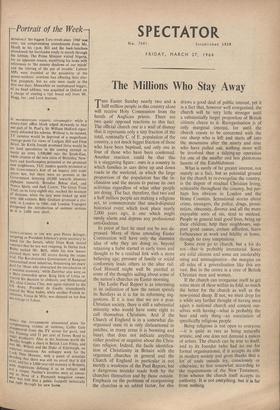The Millions Who Stay Away
THIS Easter Sunday nearly two and a half million people in this country alone will receive Holy Communion from the hands of Anglican priests. There are two quite opposed reactions to this fact. The official church one is a wail of dismay that it represents only a tiny fraction of the total, nominally C. of E. population of the country; a not much bigger fraction of those who have been baptised, and only one in four of those who have been confirmed. Another reaction could be that this is a staggering figure : ours is a country in which families in cars drive up and down roads in the weekend, in which the large proportion of the population has the in clination and the means to pursue its own activities regardless of what other people are doing. The fact, therefore, that two and a half million people are making a religious act, to commemorate that much-disputed historical event which took place nearly 2,000 years ago, is one which might surely alarm and depress any professional anti-Godman.
In point of fact he need not be too de- -pressed. Many of those attending Easter Communion will have only the dimmest idea of why they are doing so, beyond retaining a habit started in early teens and thought to be a residual link with a more believing age; pressure of family or social conformity leads others to the altar rail. God Himself might well be puzzled at some of the thoughts sailing about some of the nation's churches on Easter morning.
The Leslie Paul Report is as interesting in its indication of how the nation spends its Sundays as it is for its reforming sug- gestions. If it is true that we are a post- Christian society, there is still a substantial minority who would have some right to call themselves Christians. And if the Church of England is in a somewhat dis- organised state (it is only disheartened in patches; in many areas it is booming and busy), that does not indicate anything either positive or negative about the Chris- tian religion. Indeed, the facile identifica- tion of Christianity in Britain with the organised churches in general and the Church of England in particular is not merely a weakness of the Paul Report, but a dangerous mistake made both by the churches themselves and by those outside. Emphasis on the problems of reorganising the churches is an added factor, for this draws a good deal of public interest, yet it is a fact that, however well reorganised, the church will be very little stronger until a substantially larger proportion of British citizens cleave to it. Reorganisation is of only marginal interest, for until the church ceases to be concerned with the one sheep who is left and starts off into the mountains after the ninety and nine who have pulled out, nothing more will be involved than a tidying-up operation for one of the smaller and less glamorous haunts of the Establishment.
What is surely of far greater interest, not merely as a fact, but as potential ground for the church to re-evangelise the country, is the degree of residual Christian living, noticeable throughout the country, but per- haps less obvious in London and the Home Counties. Sensational stories about crime, teenagers, the police, drugs, prosti- tution, obscenity, divorce and all the more enjoyable sorts of sin, tend to mislead. People in general lead good lives, bring up their children, help their neighbours, sup- port good causes, endure affliction, learn forbearance at work and fidelity at home, through no easy temptations. Some even go to church, but a lot do not—that is probably immaterial. Some are solid citizens and some are intolerably smug and unimaginative—the margins on all sides of a generalisation like this are vast. But in the centre is a core of British Christian men and women.
If the church can reorganise itself to get some more of these within its fold, so much the better for the church as well as the new-joined sheep. If not, we must drop for a while any further thought of having' once again a national church and content our- selves with having—what is probably the best and only thing—an association of specitically religious people. Being religious is not open to everyone —it is quite as rare as being naturally artistic, and one does not demand a nation of artists. The church can be true to itself, and to its founder (who had no use for formal organisations), if it accepts its role in modern society and gives thanks that a lot' of souls outside try, consciously or otherwise, to live somewhat according to the requirements of the New Testament, from whence the church itself accepts its authority. It is not everything, but it is far from nothing.


































 Previous page
Previous page